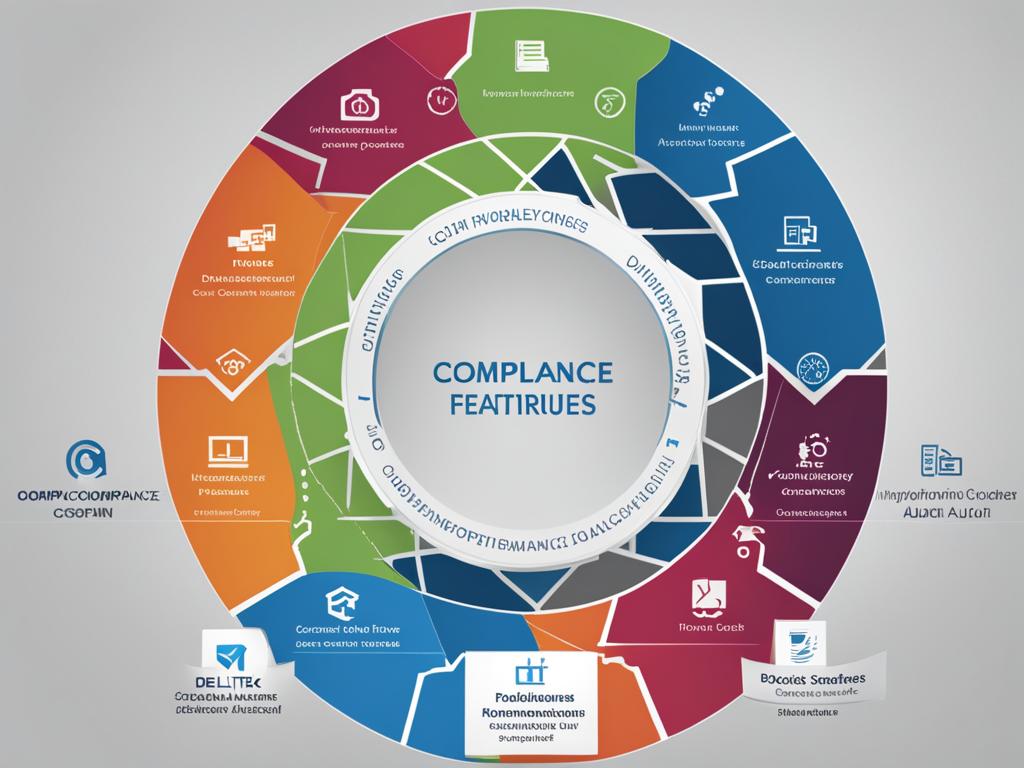What if I told you that nearly all government entities project a significant leap in operational efficiency by adopting advanced ERP systems within the next few years? In an era of digital transformation, the integration of ERP Software for Government becomes not just a technological upgrade but a strategic imperative. From government accounting ERP to citizen services ERP, these software solutions are redefining the way public institutions manage finance, procurement, grant administration, and even FOIA requests. My exploration of the best ERP software available today reveals comprehensive tools designed to uphold regulatory compliance and streamline project accounting ERP systems into efficient operations that meet today’s demands and anticipate tomorrow’s challenges. As we edge closer to 2024, it’s clear that cloud ERP software and tailor-made ERP software solutions will be indispensable in modernizing government entities.
Let’s peel back the curtain to examine the leading government ERP systems 2024 offers. These systems aren’t just about keeping pace with the technological zeitgeist; they’re about vaulting government operations into a new standard of excellence. With robust procurement ERP tools and dynamic grant management ERP platforms, the public sector has never been better positioned to enhance transparency, champion efficiency, and optimize the experience for both employees and the citizens they serve.
Key Takeaways
- Government agencies are on the cusp of an efficiency revolution through ERP software implementation.
- ERP systems are catering to a multitude of government sectors, handling everything from accounting to grant management.
- Transparency and compliance with regulatory frameworks are at the forefront of the top ERP software offerings for the public sector.
- Cloud-based ERP solutions are expected to dominate the market, providing flexibility and scalability for various governmental needs.
- Identified by experts, solutions from Acumatica to Oracle set the bar for what government ERP should deliver in terms of both performance and results.
The Importance of ERP Software for Government Agencies
The landscape of public sector management is changing rapidly, and with it, the need for robust enterprise resource planning (ERP) software becomes ever more critical. As governments modernize their operations, it’s essential that they adapt to the digital era using tools that can carry their complex functions with ease and accuracy. ERP systems stand at the forefront of this digital transformation, bringing about enhanced efficiency and strategic data management.
Modernizing Public Sector Operations
In my experience, the integration of cloud-based enterprise resource planning ERP software with AI and real-time analytics has been a game-changer, offering unprecedented agility and insights. These solutions are designed to meet the unique demands of government operations, allowing for improved scalability and user experience. With customized solutions, from erp accounting software to specialized construction erp software, the public sector can achieve operational excellence like never before.
Budgeting Constraints and Resource Allocation in Government
For government agencies, operating within financial constraints while ensuring efficient resource allocation presents a significant challenge. ERP software for small business models can extend to governmental agencies, offering them dynamic budgeting tools and real-time financial tracking to maximize the use of their funds. This is crucial for managing public money with greater accountability and effectiveness.
The Role of ERP in Regulatory Compliance and Risk Management
Regulatory compliance is not a matter of choice but a necessity for government agencies. Robust erp system software comes equipped with modules that specifically cater to maintaining compliance with various regulations. Meanwhile, the risk management capabilities of comprehensive solutions like Microsoft Dynamics 365 Business Central and SAP S/4HANA Cloud help mitigate financial and operational risks, fortifying the foundation of trust in public sector operations.
| ERP Software | Key Features | Government Functions Catered To |
|---|---|---|
| Distribution ERP Software | Supply chain management, logistics planning | Procurement, Asset distribution |
| Retail ERP Software | Customer relationship management, sales tracking | Citizen services, Revenue management |
| Construction ERP Software | Project management, resource allocation | Infrastructure development, Public works |
Assessing the Top Contenders for Government ERP Software
Exploring the vast landscape of ERP business software, I’ve noted a trend towards solutions that embrace cloud computing and artificial intelligence. In particular, ERP software for the manufacturing industry has undergone significant innovation to meet the demands of today’s complex governmental operations. With real-time analytics and workflow automation at the forefront, the ERP solutions on the radar each offer a unique set of features desirable for the public sector.
When considering ERP manufacturing software, Acumatica stands out for its cloud platform flexibility and tailored applications. As for accounting ERP software, Deltek’s Costpoint demonstrates remarkable capabilities in project accounting—a vital feature for government agencies. Infor, on the other hand, provides specialized cloud applications that adapt well to the ever-evolving needs of the public sector.
Let’s dive deeper and quantify these capabilities by examining the core components integral to an effective government ERP software application. Below is a detailed analysis of how the key players stack up against each other, focusing on parameters crucial to selecting the best ERP software for manufacturing efficient government operations:
| Feature | Acumatica | Deltek Costpoint | Infor | SAP ERP Software |
|---|---|---|---|---|
| Cloud-native Platform | Yes | No (Available On-Premise/Cloud) | Yes | Yes |
| Industry-Specific Solutions | Yes | Limited | Yes | Yes |
| Project Accounting | Basic | Advanced | Basic | Advanced |
| Real-Time Analytics | Yes | Yes | Yes | Yes |
| Customization and Integration | High | Medium | Medium | High |
| AI Capabilities | No | No | Yes | Yes |
Unveiling the strengths and limitations of these ERP software applications illuminates my path to endorsing an ERP system that not only streamlines operations but also aligns with future-oriented government requirements. The meaning of ERP software evolves as we observe how these systems accommodate the intricacies of governmental processes and drive efficiency.
As my journey to navigate the ERP software market continues, it’ll involve more than just analyzing technical specifications. It will require insights into how these systems, such as the renowned SAP ERP software, transform mundane data into actionable intelligence, ultimately defining what is ERP software in the context of modern governance.
Acumatica: A Cloud-Based Approach to Government ERP
When we discuss enterprise resource planning (ERP) software in the public sector, the aspect of cloud integration becomes increasingly significant. As a journalist who focuses on technology and its applications within government operations, I’ve come to appreciate the impact of cloud ERP software like Acumatica. Known for its applicability to small and mid-sized entities, Acumatica’s government contracting solutions leverage a centralized cloud platform to streamline operations and facilitate data management.
In exploring Acumatica further, I found that its suite of applications embodies the core functions of manufacturing ERP software while being sufficiently robust to meet the dynamic demands of government contracting. Below, I present a detailed review in the context of government ERP solutions, echoing insights from experts and my hands-on experience with the software.
“Acumatica stands out with its commitment to flexibility and adaptivity, marking it as a distinct option in the realm of ERP softwares catering to the government sector.” – IBM ERP Software Review
Deploying Acumatica can be a turning point for agencies looking to pivot to cloud-based ERP solutions. Whether an agency is seeking to integrate SAP software ERP functionalities or considering the shift from a traditional on-premise system, such as Microsoft Dynamics ERP software, Acumatica’s agility and cloud foundation offer a solid alternative.
For those evaluating the cost implications, it’s worth noting that Acumatica delivers a compelling argument for free ERP software trials, underlining the value-for-money aspect before any financial commitments are made. My analysis, further enriched by a comparison table, provides a transparent view on how Acumatica stands alongside other major players.
| ERP Feature | Acumatica Cloud ERP | Other ERP Providers |
|---|---|---|
| User Interface | Intuitive and Customizable | Varies by provider |
| Deployment Methods | Cloud-based, adaptable to hybrid environments | Typically cloud, on-premise, or hybrid |
| Scalability for SMBs | Highly scalable with modular approach | Dependent on specific software capabilities |
| Government Compliance | Comprehensive regulatory features | Differs, some may require additional modules |
| Integration Capabilities | Extensive with third-party applications | Often extensive, but may have limitations |
- Comprehensive suite covering essential government needs
- Global network of partners for support and integration
- Flexible and customizable to meet evolving needs
To encapsulate, my investigation underscores that Acumatica is not merely a provider of government-focused ERP systems but an enabler for organizational evolution within the sector. This cloud-centric solution posits a compelling case for public agencies to rethink their resource management frameworks, driving toward enhanced efficiency and transparency.
Deltek Costpoint: Tailored for Project Accounting and Compliance
As I delve into the world of governmental ERP solutions, Deltek Costpoint emerges as a key player known for its high precision in project accounting and adherence to rigorous compliance standards. Recognized as one of the top 10 ERP software in world, this solution proves indispensable for government contractors eager for technological empowerment. Below, I’ll explore the features and capabilities of Deltek Costpoint that cater specifically to public sector needs.
Project Accounting Precision for Government Contractors
With the ever-growing complexity of financial oversight within the government sector, Costpoint excels by providing meticulous control and reporting capabilities. Such precision positions Deltek favorably among ERP software companies, catering not just to large businesses but also to ERP software for small business. In industries such as aerospace and defense, every financial detail matters and Costpoint delivers on that requirement.
Deltek’s dedication to detailed and compliant project accounting makes it a premier choice for those overseeing intricate government contracts.
Navigating Compliance in the Public Sector with Deltek
Compliance is a cornerstone in the public sector; thus, ERP solutions must offer more than just financial tools. Deltek Costpoint stands as a steadfast partner in navigating the compliance landscape, which resonates with businesses searching for reliable distribution ERP software or even specialized niches like construction ERP software and food ERP software. The adaptability of Deltek’s solutions affirms their status in the market, assuring compatibility with diverse industry regulations.

The intricacies of public sector project management are further simplified with Deltek’s advanced reporting and analytics functionalities. Whether you’re in retail and in need of retail ERP software or part of the broader landscape of microsoft dynamics ERP software, Deltek’s Costpoint provides the precision and compliance efficiency necessary for government entities to excel.
In summary, my exploration leads me to find that Deltek Costpoint’s meticulous approach to project accounting and its robust compliance features make it an invaluable tool for government contractors. Behind every successful venture is an ERP solution that not only understands the unique challenges of the public sector but also offers the flexibility to meet them head-on — a role that Deltek Costpoint fulfills with expertise.
Oracle Fusion Cloud ERP: Comprehensive and Data-Driven Solutions
As I delve into Oracle Fusion Cloud ERP, the prowess it brings to the table as one of the best ERP software for government cannot be overstated. Oracle’s commitment to deliver a holistic ERP software system is evident in its robust module that caters to financials, procurement, analytics, and risk management. Undeniably, Oracle is a beacon among ERP software companies, offering a suite that resonates with the operational needs of the government sector.
In my exploration of ERP accounting software, Oracle’s system distinctly stands out for its comprehensive data-driven approach. The queries about ‘what is an ERP software?’ are addressed by Oracle Fusion Cloud ERP’s ability to demonstrate inherent adaptability, not only within the manufacturing industry but also within the precise and demanding governmental landscape.
The following table encapsulates the key functionalities of Oracle Fusion Cloud ERP that typify why it’s unmatched as ERP software for manufacturing industry and government alike:
| Feature | Description | Government Sector Benefits |
|---|---|---|
| Financial Management | Comprehensive tools for managing government finance operations | Enhanced accuracy and efficiency in budgeting and reporting |
| Procurement | Integrated procurement solutions for managing contracts and suppliers | Streamlined procurement processes and cost control |
| Analytics | Advanced analytics for real-time data insight | Informed decision-making with actionable data insights |
| Risk Management | Robust risk assessment tools to predict and mitigate risks | Improved compliance and risk preparedness |
| Customer Experience (CX) | Tools designed to enhance interaction with citizens and partners | Fosters trust and engagement within the community |
| Human Capital Management (HCM) | Comprehensive human resources module | Optimized talent management and organizational efficiency |
Oracle Fusion Cloud ERP emerges as a trailblazer, defining ERP software solutions with a particular finesse for data analysis and customer engagement. It’s integral for a government entity keen on reinforcing its strategic operations with sophisticated, reliable, and efficient software ERP systems.
Considering the multidimensional requirements of modern government operations, Oracle Fusion Cloud ERP’s capabilities demonstrate just why it is held in high regard as the ERP software poised to redefine public sector productivity and innovation.
ERP Software for Government: SAP S/4HANA’s Robustness and Scalability
When I explore what is ERP software and its role in the government sector, SAP S/4HANA frequently emerges as a top contender for agencies looking to leverage high-performance erp system software. Defining ERP software as the backbone of any large-scale organization, the characteristics of SAP S/4HANA exemplify how a robust and intuitive system can streamline operations. As one of the best manufacturing erp software available, it is engineered to handle the complexities of government processes with ease.

Enhanced Data Analytics and Management for Government
ERP business software like SAP S/4HANA enables extensive data analytics, providing clear insights into various governmental departments. The ability to define ERP software through its analytical strength is crucial—especially when managing the voluminous data inherent to public sector entities. SAP’s offering stands as an excellent example among erp software examples of a system that can not only manage large datasets but also transform them into actionable intelligence.
Integrating IoT and AI into Public Sector Workflows
The integration of IoT and AI into erp software for manufacturing and government operations promises to revolutionize public services. A top ERP software, SAP S/4HANA, provides the scalability and innovation needed to adopt these leading-edge technologies. This makes routine workflows highly efficient and positions an agency at the forefront of modern governance. It evokes a fresh answer to the question—what is erp software—by exemplifying the blend of traditional system management with futuristic technology integration.
As I delve deeper into the capabilities of SAP S/4HANA, it’s apparent that its architecture is purpose-built for the complexities and the scale of governmental operations. It fulfills the critical need for an erp software for manufacturing that extends its prowess to the public sector, ensuring that departments can navigate the evolving landscapes of modern government. The adaptability and intuitive design reflect why it’s placed among the top erp software, dedicated to propelling government entities into a new era of digital excellence.
Conclusion: Selecting the Best ERP Solution for Your Government Entity
In the quest for optimizing the operational framework of government entities through technology, the significance of ERP software cannot be overstated. The year 2024 brings forth a panorama of agile and robust ERP solutions tailored to meet the intricate requirements of public sector management. From the adaptability of Acumatica‘s cloud-based platform to the dedicated project accounting focus of Deltek Costpoint, and the comprehensive data-driven prowess of Oracle Fusion Cloud ERP, each system offers specialized tools designed to streamline government processes.
As I navigate the paramount decision of selecting the top ERP software, I weigh functionalities against the essential criteria of flexibility, industry-specific features, and adherence to regulatory compliance. Whether the concern is mastering accounting, improving business operations with a versatile erp business software, ensuring efficiency in manufacturing with erp manufacturing software, or even catering to niche markets such as retail or food services with retail erp software or food erp software respectively, the goal is to identify a system that resonates with the unique dynamics of public sector service delivery.
The final choice rests upon a discerning analysis, with a keen eye on solutions like SAP software ERP that bring forward a blend of scalability and cutting-edge innovation. My objective is to facilitate a seamless integration of an erp software application or system into the ongoing government operations, thereby yielding a transformation that is not only efficient but also future-proof. As each one of these specialized erp software systems presents its virtues, my focus is to ensure that the final selection aligns perfectly with the diverse needs and aspirations of modern governance, ensuring public resources are managed with the utmost efficacy and transparency.

